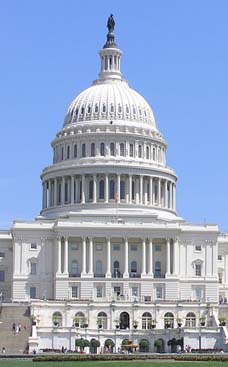2006.11.01: November 1, 2006: Headlines: COS - Kenya: Training: Healthcare Financial Management: Lisa Sorenson discusses her life as a Peace Corps volunteer in Kenya
Peace Corps Online:
Directory:
Kenya:
The Peace Corps in Kenya:
2006.11.01: November 1, 2006: Headlines: COS - Kenya: Training: Healthcare Financial Management: Lisa Sorenson discusses her life as a Peace Corps volunteer in Kenya
Lisa Sorenson discusses her life as a Peace Corps volunteer in Kenya

Training was held in Kitui, a rural village about three hours east of Nairobi, the land of the Kamba tribe. We were each assigned a homestay family and lived on a shamba (farm). There we learned to be Kenyan, which is not an easy task. You learn to draw water from the well, cook on a jiko (tin can with coal), take a bath in a bucket, and try to accept a hole in the ground as your toilet (choo). You go through extreme culture shock, missing your family and friends, while your system is trying to adjust to strange food. You discover the clothes you packed in America aren't acceptable attire, you're being scared by safety and security lectures, and you're struggling to learn a new language.
Lisa Sorenson discusses her life as a Peace Corps volunteer in Kenya
Journey to Kenya
Nov 1, 2006
Healthcare Financial Management
Member Spotlight
Last month's issue of hfm featured a profile of Lisa Sorenson, a former HFMA member who recently moved to Kenya as a Peace Corps volunteer, fulfilling a lifelong dream. In part two of this profile, Sorenson shares stones about life in Kenya.
Q. What did the training involve?
A. Training was held in Kitui, a rural village about three hours east of Nairobi, the land of the Kamba tribe. We were each assigned a homestay family and lived on a shamba (farm). There we learned to be Kenyan, which is not an easy task. You learn to draw water from the well, cook on a jiko (tin can with coal), take a bath in a bucket, and try to accept a hole in the ground as your toilet (choo). You go through extreme culture shock, missing your family and friends, while your system is trying to adjust to strange food. You discover the clothes you packed in America aren't acceptable attire, you're being scared by safety and security lectures, and you're struggling to learn a new language.
There are lessons on politics, tribalism, history, and culture. The medical staff tells you about all the viruses, bacteria, bugs, and germs you'll be exposed to, while giving you yet another series of immunization shots.
Then you have to deal with the realization that you will be assigned a site-alone-someplace in the bush, and you'll need to get there by yourself with all your personal belongings. You already know that your every move is being watched. When you go into town for market day everyone is staring, laughing, and pointing and calling you a "mzungu." Saturday morning entertainment for the locals was coming to watch the mzungu do her laundry. (I'm still not sure what was so funny about the way I wash my clothes.) All of this while having nightmares from Mephaquin, the anti-malaria drugs!
Q. What do you love most about being in the Peace Corps ?
A. The orphanage is the highlight of my assignment. There are currently 40 children, and plans to house 150 in the future. All of my (and I fondly call them mine) kids are HIV-negative, but they have lost parents to AIDS. It is estimated that Kenya has 1.1 million children who are orphaned as a result of AIDS.
Q. What are your responsibilities in Kenya?
A. The community needs to find ways of producing income. I expect the next two years will be spent working with the local women's group to establish a couple of income-generating projects of bead- making and basket-weaving. The community youth group needs something to do, and the orphans need one-on-one personal attention. I'm mobilizing the youth group to create a series of educational programs to prepare them to mentor the orphans. I'm hoping to create a Big Brother and Big Sister type of program.
A newly built medical clinic needs to become accepted by the community as the center for treatment. People don't have the money to pay for treatment, but the services still have a cost associated with delivery, and I'm not sure where we are to get the funds to restock the medication if people don't pay. But how can you tell a woman with a sick baby that you won't give her the medication she needs? I guess I'm not out of the healthcare finance sector. I will also work toward bringing out a mobile clinic to see how people in the community accept the concept of knowing their HIV status.
Q. What has surprised you about the experience?
A. My own personal strength.
PLEASE SHARE!
Are you an HFMA member with a fun or unusual hobby or interest? Do you have a humorous or fascinating workplace story to share? E- mail us at jwilliams@hfma.org.
Copyright Healthcare Financial Management Association Nov 2006
Links to Related Topics (Tags):
Headlines: November, 2006; COS - Kenya; Training
When this story was posted in November 2006, this was on the front page of PCOL:





Peace Corps Online The Independent News Forum serving Returned Peace Corps Volunteers
 | Ron Tschetter in Morocco and Jordan
On his first official trip since being confirmed as Peace Corps Director, Ron Tschetter (shown at left with PCV Tia Tucker) is on a ten day trip to Morocco and Jordan. Traveling with his wife (Both are RPCVs.), Tschetter met with volunteers in Morocco working in environment, youth development, health, and small business development. He began his trip to Jordan by meeting with His Majesty King Abdullah II and Her Majesty Queen Rania Al Abdullah and discussed expanding the program there in the near future. |
 | Chris Dodd's Vision for the Peace Corps
Senator Chris Dodd (RPCV Dominican Republic) spoke at the ceremony for this year's Shriver Award and elaborated on issues he raised at Ron Tschetter's hearings. Dodd plans to introduce legislation that may include: setting aside a portion of Peace Corps' budget as seed money for demonstration projects and third goal activities (after adjusting the annual budget upward to accommodate the added expense), more volunteer input into Peace Corps operations, removing medical, healthcare and tax impediments that discourage older volunteers, providing more transparency in the medical screening and appeals process, a more comprehensive health safety net for recently-returned volunteers, and authorizing volunteers to accept, under certain circumstances, private donations to support their development projects. He plans to circulate draft legislation for review to members of the Peace Corps community and welcomes RPCV comments. |
 | He served with honor
One year ago, Staff Sgt. Robert J. Paul (RPCV Kenya) carried on an ongoing dialog on this website on the military and the peace corps and his role as a member of a Civil Affairs Team in Iraq and Afghanistan. We have just received a report that Sargeant Paul has been killed by a car bomb in Kabul. Words cannot express our feeling of loss for this tremendous injury to the entire RPCV community. Most of us didn't know him personally but we knew him from his words. Our thoughts go out to his family and friends. He was one of ours and he served with honor. |
 | Peace Corps' Screening and Medical Clearance
The purpose of Peace Corps' screening and medical clearance process is to ensure safe accommodation for applicants and minimize undue risk exposure for volunteers to allow PCVS to complete their service without compromising their entry health status. To further these goals, PCOL has obtained a copy of the Peace Corps Screening Guidelines Manual through the Freedom of Information Act (FOIA) and has posted it in the "Peace Corps Library." Applicants and Medical Professionals (especially those who have already served as volunteers) are urged to review the guidelines and leave their comments and suggestions. Then read the story of one RPCV's journey through medical screening and his suggestions for changes to the process. |
 | The Peace Corps is "fashionable" again
The LA Times says that "the Peace Corps is booming again and "It's hard to know exactly what's behind the resurgence." PCOL Comment: Since the founding of the Peace Corps 45 years ago, Americans have answered Kennedy's call: "Ask not what your country can do for you--ask what you can do for your country. My fellow citizens of the world: ask not what America will do for you, but what together we can do for the freedom of man." Over 182,000 have served. Another 200,000 have applied and been unable to serve because of lack of Congressional funding. The Peace Corps has never gone out of fashion. It's Congress that hasn't been keeping pace. |
 | PCOL readership increases 100%
Monthly readership on "Peace Corps Online" has increased in the past twelve months to 350,000 visitors - over eleven thousand every day - a 100% increase since this time last year. Thanks again, RPCVs and Friends of the Peace Corps, for making PCOL your source of information for the Peace Corps community. And thanks for supporting the Peace Corps Library and History of the Peace Corps. Stay tuned, the best is yet to come. |
 | History of the Peace Corps
PCOL is proud to announce that Phase One of the "History of the Peace Corps" is now available online. This installment includes over 5,000 pages of primary source documents from the archives of the Peace Corps including every issue of "Peace Corps News," "Peace Corps Times," "Peace Corps Volunteer," "Action Update," and every annual report of the Peace Corps to Congress since 1961. "Ask Not" is an ongoing project. Read how you can help. |
Read the stories and leave your comments.

Some postings on Peace Corps Online are provided to the individual members of this group without permission of the copyright owner for the non-profit purposes of criticism, comment, education, scholarship, and research under the "Fair Use" provisions of U.S. Government copyright laws and they may not be distributed further without permission of the copyright owner. Peace Corps Online does not vouch for the accuracy of the content of the postings, which is the sole responsibility of the copyright holder.
Story Source: Healthcare Financial Management
This story has been posted in the following forums: : Headlines; COS - Kenya; Training
PCOL35200
08


















